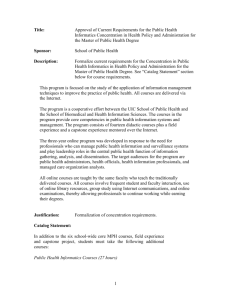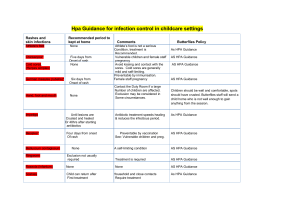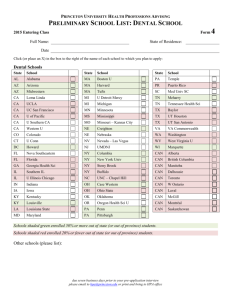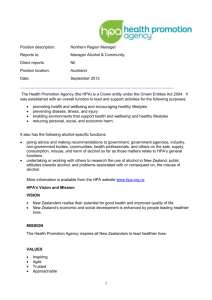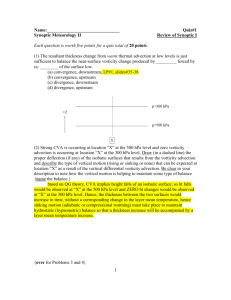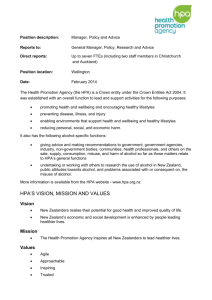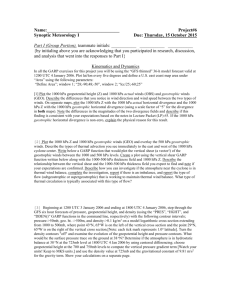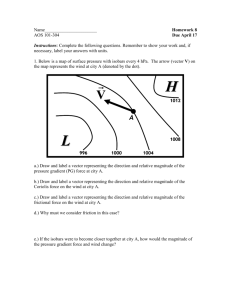HPA Undergraduate Handbook - The College of Health and Human
advertisement
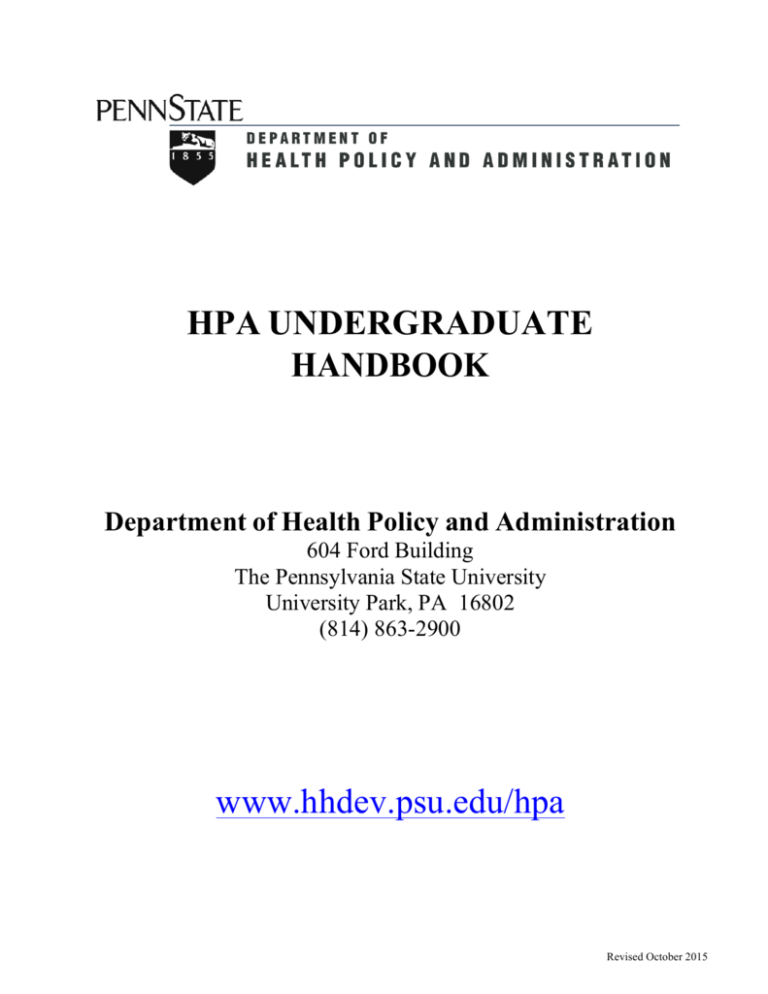
HPA UNDERGRADUATE HANDBOOK Department of Health Policy and Administration 604 Ford Building The Pennsylvania State University University Park, PA 16802 (814) 863-2900 www.hhdev.psu.edu/hpa Revised October 2015 TABLE OF CONTENTS Important Websites for HPA Students ............................................................................................ 3 Welcome to HPA ............................................................................................................................. 4 What is Health Policy and Administration? ...................................................................................... 5 HPA Undergraduate Program Goals ................................................................................................. 6 Curriculum and Degree Requirements ............................................................................................ 7 Advising Policies ............................................................................................................................. 10 HPA Course Descriptions and Supporting Courses ........................................................................ 13 Other Supporting Programs ............................................................................................................. 14 Academic Honesty ......................................................................................................................... 15 Scholarships for HPA Students...................................................................................................... 16 HPA Student Organizations/Activities ............................................................................................ 16 Information for HPA Minority Students.......................................................................................... 16 2 IMPORTANT WEBSITES FOR HPA STUDENTS HPA Undergraduate Program: www.hhdev.psu.edu/hpa/undergrad/index.html HPA Undergraduate Adviser: http://www.hhd.psu.edu/hpa/undergraduate/advising-hpa PSU Student Aid: www.psu.edu/studentaid/ Career Services: http://studentaffairs.psu.edu/career/students/ HPA Faculty: http://www.hhd.psu.edu/hpa/Faculty HPA Department Staff: http://www.hhdev.psu.edu/hpa/staff-contacts 3 WELCOME TO HPA The HPA major has a great deal of flexibility. It's a blend of courses in liberal arts, business administration, and the health sciences, including HPA. However, the flexibility means you bear a major responsibility—together with faculty and the department adviser—for designing an academic plan that fits your goals. This guide provides you information on HPA academic requirements, advising, supporting and related courses, areas of interest, minors, and internship information. The HPA Department is committed to continuously improving the quality of its baccalaureate program. You, the student, are the major reason the faculty is here. Many past improvements came through student comments. We need to hear from you about the quality of our teaching and advising. If you have complaints or compliments—or especially, suggestions for improvement—please email or meet with me directly. Mark Sciegaj, Ph.D., MPH Director of Undergraduate Program 601F Ford Building (814) 863-2863 mxs838@psu.edu 4 WHAT IS HEALTH POLICY AND ADMINISTRATION? The HPA major prepares students for management and policy positions or graduate study in the field of health care. Students in the major develop the skills and knowledge needed to understand the complex societal problem of providing access to quality health care at a reasonable cost. All Health Policy and Administration students complete an internship in a health-care-related setting, giving them valuable experience and contacts in the industry. HPA students study a multidisciplinary curriculum that prepares them to work as health services managers or health analysts. Health services managers, also called health care executives or health care administrators, plan, direct, and coordinate medical, health, and/or long-term care services. They might manage an entire facility or specialize in managing a specific clinical area or department, administrate a program, or manage a practice for a group of providers. Health analysts are employed throughout the health care industry gathering, compiling, modeling, validating, and analyzing data needed by different organizations of providers, payers, and policy makers. Analysts help these organizations understand the current trends in the health care system and to make well-informed decisions. Both health services managers and analysts must be able to adapt to changes in health care laws, regulations, and technology. HPA students have also used the degree to prepare for graduate study in business, law, medicine or allied health fields, health administration, health services research or policy, and public health. In addition to our undergraduate degree, HPA offers three graduate degree programs, a Master of Health Administration (M.H.A), a Master of Science in Health Policy and Administration (M.S.), and a Ph.D. in Health Policy and Administration. We also offer a 5-year integrated B.S./M.H.A. degree. For more information on our graduate programs, see our website http://www.hhd.psu.edu/hpa/graduate. The HPA is certified by the Association of University Programs in Health Administration (AUPHA), a national consortium of similar programs. AUPHA has many resources available for students interested in health administration on its website www.aupha.org. 5 HPA UNDERGRADUATRE PROGRAM GOALS Students enrolled in The Department of Health Policy and Administration Undergraduate Program strive through their studies to attain specific goals. Upon graduation from the program, students will: Demonstrate knowledge of the organization of the U.S. health service delivery system ▪ Identify the various components of the U.S. health care system ▪ Identify the similarities and differences among the various components of the U.S. health care system ▪ Evaluate the major strengths and weaknesses of the U.S. health care system ▪ Compare and contrast the U.S. health care system with those in other developed countries. ▪ Understand major concepts of health care financing ▪ Identify the different types of public insurance and the populations covered ▪ Define major concepts of private insurance, such as risk sharing, moral hazard and adverse selection ▪ Distinguish between retrospective and prospective payment systems among the various components of the U.S. health care system Use management theory and professional processes in managing health care organizations and workers ▪ Apply organizational behavior theories to situations in health care management ▪ Solve organizational challenges using quality improvement tools ▪ Synthesize financial and economic information to make decisions in health care organizations ▪ Formulate organizational strategies ▪ Evaluate ethical issues in managerial decision-making Demonstrate understanding of the government organizations and policy processes involved in health policy ▪ Identify and define the various Federal agencies that influence health policy in the U.S. ▪ Evaluate ethical issues involved in policy-making decisions ▪ Identify current U.S. policies influencing health care delivery ▪ Describe the Federal and State legislative processes and explain how each affects the development and implementation of health policy Show knowledge of determinants of individual and population health and risk factors for illness, health behavior and its impact on the health care system ▪ Define, give examples and critically evaluate health disparities ▪ Recognize anatomy and physiology of each system in the human body and classify diseases within each system ▪ Use empirical methods to identify community health problems, develop action plans, and assess their outcome ▪ Identify the biological, psychological, social, economic, cultural, and political factors that contribute to health problems and/or impede their resolution 6 CURRICULUUM AND DEGREE REQUIREMENTS To meet HPA Undergraduate Program goals, your graduation requirements include courses in three areas: general education, major degree requirements, and electives. Your degree requirements consist of 45 credits in general education. The major degree requirements for a B.S. in Health Policy and Administration include 31 credits in prescribed courses, 18 to 20 credits in additional courses, and 36 credits (9 of these must be at the 400 level) in supporting courses and related areas. Finally, you may need to complete up to 2 credits in electives, depending on your other course selections. Since ECON 102, PLSC 001 or SOC 023, STAT 200 or 250 and CMPSC 101 or 203 count for both General Education and Major Degree Requirements this makes a total of 120 credits. As part of these 120 credits students must complete a first-year seminar, 3 credits in United State cultures (US), 3 credits in International culture (IL), and 3 credits in a writing across the curriculum (W) course. HPA 301W fulfills this requirement for HPA students. In addition, all the prescribed and additional courses in the major must be completed with a C grade or higher. Course Sequencing Assuming that you have completed your General Education credits, at least two supporting courses, and HPA 101 during the first two years, a typical sequence of courses during the last four semesters for an HPA student might look like this: Fall, 5th Semester HPA 310 HPA 390 SOC 023 Supporting Course CMPSC 101/203 Spring, 6th Semester HPA 400-Level Course HPA 332 HPA 301W Supporting Course Summer HPA 395 Fall, 7th Semester HPA 400-Level Course 400-Level Supporting Supporting Course Supporting Course ENG 202 Spring, 8th Semester HPA 400-Level Course 400-Level Supporting 400-Level Supporting Supporting Course HPA 395: Any summer after completion of prerequisites, usually following the 6th semester is recommended. Of course, your individual schedule may vary depending upon the courses you have taken before entering the major. Choosing Courses One advantage of the HPA degree is that students are given the flexibility to create a unique curriculum. With 36 credits in supporting courses and related areas, students should have room to explore a few topics before focusing their studies. The HPA Department encourages students to develop a set of courses that fits personal goals. We recommend that students think carefully about developing a set of courses that will prepare them for graduation and that they consult with faculty and the department adviser often to discuss these plans. Supporting courses should be used to build some depth and skill in one or more areas— long-term care, marketing, economics and finance, human resources, and industrial relations, among others—which you can market to employers as your unique qualifications. Students who haphazardly pick courses because they are the easiest courses will find themselves at a distinct disadvantage in the job market. Employers care more about the skills you have to make a contribution to their company than your GPA. 7 To help you in making your choices, we provide several aids below. Following a list of some common questions, you will find a note about the required field experience courses. This is followed by a description of your HPA audit, a record that shows your progress toward graduation. After that, we list all the courses currently offered by HPA. We also describe the set of department-approved courses that meet the supporting courses and related areas requirement. Finally, we list some ideas about how you might best use your supporting course credits, including several areas of interest and some minors typically taken by HPA students. While not required for graduation, a minor is a group of courses that focus interest in specialized areas. A minor may be combined with the HPA major to give a student specialized knowledge. Before deciding on a minor, a student should meet with his/her faculty mentor and the HPA department adviser. If there is a minor of interest not on this list, please consult with your faculty mentor or department adviser. Frequently Asked Questions: http://www.hhd.psu.edu/hpa/undergraduate/faq Field Experience Requirement All students in the Health Policy and Administration Program are required to participate in a field experience (sometimes called a practicum or internship) in a health care facility or related agency for a minimum of ten, 40-hour weeks. The field experience should provide practical experience in the administration of health care organizations, health services planning and delivery, and/or research in the health care field. The field experience includes a twocourse requirement: HPA 390 or 390W, Professional Development in HPA, and HPA 395, Field Experience in HPA. While the HPA Department assists students looking for a field experience, the ultimate responsibility for securing a field experience with a health care facility or related agency is up to you. It is our conviction that this approach is, in itself, a good practical experience for students. The information you need is provided in the preparatory course, HPA 390 or 390W. The department provides several resources to assist you in finding internships. Contact the HPA department adviser or the Professional Development instructor for more information. New internship opportunities are sent out through email or posted on the internship website. The field experience can only be scheduled in the summer. Prior to the field experience, the student MUST have satisfactorily completed HPA 101, HPA 3 0 1 o r 301W, HPA 310, HPA 332 and 390 o r 3 9 0 W with a C grade or better. The HPA Department strongly recommends students complete HPA 390 in the fall or spring of their junior year. This will provide the maximum amount of time to search for a field experience. The HPA Department also strongly recommends that students complete CMPSC 101 or CMPSC 203, ECON 102, PL SC 001, ACCTG 211 or HPA 297A, STAT 200 or 250, and BA 301 or RM 302, before a field experience. Note that the actual field experience places important demands on students. HPA 395 is a threecredit course. This means you will have to pay tuition and fees for these credits. Expect to receive a bill for this in early May. The money from these credits is used to pay for phone and mailing costs associated with the field experience, field experience coordinator costs, and other personnel and material costs required for HPA 395. 8 Furthermore, note that the field experience is just like a full-time job. Because of the demands of the field experience, you may not be able to earn much income during that summer. Please plan accordingly. Finally, while completing HPA 395, you are only allowed to take three additional credits, so do not plan on taking many extra credits during your field experience. While we recognize the costs—tuition, time, foregone earnings, and other field experience sacrifices—department members believe, and our alumni report, this internship is the most valuable experience you pay for in your education. In addition to the direct educational benefits, the field experience enhances every course you take by illustrating how skills you learn in class are applied in health care. Furthermore, many students get their first job at their field experience site or through a contact made at their field experience site. HPA Audit Your HPA audit is the way the department keeps track of your progress toward graduation. You can access your audit electronically through the University’s advising webpage, www.elion.psu.edu. You are strongly encouraged to review your audit each semester and use it to track your progress. While the audit looks confusing, it is easy to understand once you become familiar with its format. As you complete each requirements the “–” sign next to the requirement will be changed to a “+” sign. The first section of your audit includes general information about you and your degree program, including the name of your adviser. This is followed by information on your grades in the most recent semester. The next section lists the first set of major requirements, the prescribed and additional courses showing the HPA requirements. The HPA major requirements in supporting courses and related areas appear next on your audit, including the six credits in economics and/or political science, and the 30 credits selected in consultation with your adviser. Notice that additional requirements—such as the requirement for a C or higher in a course or the requirement that nine of your credits in supporting courses or related areas be at the 400 level—are also indicated in the major requirements sections. The next part of the audit shows your progress toward completing the general education requirements, listing the number of credits needed in writing and speaking (GWS) courses, quantification (GQ) courses, natural sciences (GN) courses, arts (GA) courses, humanities (GH) courses, social and behavioral sciences (GS) courses, and health and physical activity (GHA) courses. As you complete each requirement the - sign next to the requirement will be changed to a + sign. Below the general education requirement section is the area where any electives will be listed, as well as sections for other graduation requirements, including the writing across the curriculum (W) requirement, the United States cultures (US) and international cultures (IL) requirements, and a few others. Just below this is a legend that explains the symbols used on the audit. In most cases, the computer will correctly assign a course on the audit, but occasionally a problem will surface. In some cases, a course will appear in one location that seems wrong, 9 but the course actually will be switched to the correct location once other courses are completed. A meeting with your faculty mentor or the department adviser should help you understand the audit and allow you to check its accuracy. Once again, the HPA Department recommends that you review your audit each semester. ADVISING POLICIES HPA's Advising Policies and Process It is very important for HPA students to understand the University’s advising policies. Please carefully read the University’s policies on advising: www.advising.psu.edu. Advising is a continuous process during your college career. It is a sequence of decisions you make, assisted by a set of advising partners: first with the College Advising Center, a DUS adviser, or your Commonwealth Campus adviser; your faculty mentor and the HPA department adviser. As the University advising policies indicate, the final responsibility for your decisions rests with YOU. Since HPA offers a diverse set of career opportunities and enormous flexibility in your course choices, it is imperative that you take your role in the advising process seriously. Pre-major and major students, non-degree students, students transferring into Penn State from another school, and other students not yet in the HPA major can get information from HPA’s department adviser, who provides students interested in the HPA major with the information necessary to explore their potential opportunities. After you have selected HPA as your major, you will be assigned an HPA faculty mentor. If you are not sure who your HPA faculty mentor is, you can call the HPA office. As an HPA student, you have two important resources in the department—your faculty mentor and the HPA department adviser. It is important to understand the roles of both your faculty mentor and the department adviser. Your faculty mentor will be most helpful for discussing issues about career plans, such as jobs and graduate schools, and how course choices or minors fit into your plans. Keep in mind that you can make an appointment to see any faculty member, if you think that person might be helpful. The department adviser, on the other hand, should be consulted for questions about transfer credits, course drop/adds, course substitutions, graduation requirements, and other academic advising tasks. While the department adviser has primary responsibility for these issues, your faculty mentor may be consulted as well. HPA faculty mentors and the department adviser can be reached through e-mail, as well as by phone. Department announcements are usually communicated in three ways. First, they are announced in HPA classes. Second, they are posted on bulletin boards outside 604 Ford Building. Finally, the HPA Department has an electronic email list that is used to send out information. Most students will be signed up automatically, but if you are not receiving these emails, just send a note to the undergraduate staff assistant and you will be added to the distribution list. The latest news and events for HPA can be found at www.hhdev.psu.edu/hpa/News/index.html. 10 To ensure you get the best quality advising possible, the HPA Department recommends the following: Faculty Mentors 1. Soon after declaring your major, make an appointment to introduce yourself to your faculty mentor. Take this opportunity to tell him/her a little about yourself and get to know your mentor. Faculty mentors are very important sources of references for jobs and graduate schools. It is important to build a close relationship with one or more HPA faculty members. Appointments can be made by emailing, calling, or visiting your mentor or by calling the HPA office, (814) 863-2900. If you must cancel a scheduled appointment, please call. 2. If your mentor is out when you call, you can leave a message on voice mail or call the HPA Department office to leave a message. MAKE SURE YOUR MESSAGE INCLUDES YOUR NAME, STUDENT ID NUMBER, EMAIL ADDRESS, PHONE NUMBER, AND THE REASON YOU CALLED. 3. Keep a folder with all your advising material. Bring that folder to all meetings with your mentor. It will serve to answer questions, keep track of past decisions, and monitor your academic progress. 4. After your initial meeting with your faculty mentor, you are strongly advised to schedule an appointment at least once a semester. It is only by meeting with your faculty mentor on a regular basis that you will develop a good relationship. Before each meeting you should look over your HPA audit, on the web through www.elion.psu.edu, and think about the purpose of the meeting. Be aware of your progress toward graduation. Consider what you will do after graduation and what courses or plans you want to discuss. Come prepared to the meeting with specific topics you want to discuss. 5. Faculty mentors are important to your success. If you don't make yourself known to your mentor, it will be very difficult to get a letter of recommendation for a first job or graduate school. A professor cannot recommend you without knowing you. Take advantage of the opportunities you have. Department Adviser 1. The HPA’s department adviser provides advising for both pre-major students and students in the HPA major. 2. Department adviser appointments can be made by going to the following website: www.hhdev.psu.edu/hpa/undergrad/index.html (scroll down and select the advising scheduler link). 3. Soon after identifying the HPA degree as your area of interest, make an appointment to see the HPA department adviser. At this meeting you should review the courses you have taken and ask any questions you might have about major and graduation requirements. It is important to identify any problems quickly. Please note that during the registration time frame it is important to book your advising appointment two weeks or more in advance of your schedule date. 11 The department adviser is the best person to consult for several topics, including: Drop/add of courses and routine late drops Signature for routine forms Course scheduling and registration Deadline information General education requirements Writing intensive course requirements Satisfactory/unsatisfactory grading Information on minors Information on University resources Transfer credits Course substitutions Academic drop and reinstatement Petitions of academic policies Cultural diversity course requirements C-required courses Graduation requirements Review of HPA audit Independent learning courses Topics in bold will almost certainly require an appointment. They typically require additional time. 4. Just as for meetings with your faculty mentor, you should look over your HPA audit and think about the purpose of the meeting. Be aware of your progress toward graduation. Come prepared to the meeting with specific questions you want answered. Key Advising Checkpoints 1. 3rd or 4th semester: Meet with the department adviser to go over information on the HPA major and the entrance to major process. Review audit to identify that prerequisites for HPA 300-level courses have been met. 2. 5th or 6th semester or earlier: Take HPA 390W (Preparation for Field Experience in Health Policy and Administration) and begin your internship search for HPA 395 (Field Experience in Health Policy and Administration). Review HPA audit with faculty and department advisers. 3. 6th semester: Review your HPA audit with the department adviser and identify remaining graduation requirements. 4. 7th s emester: If you are planning to go to graduate school, you should take the Graduate Record Examination (GREs), Graduate Management Aptitude Test (GMATs) or other exams. Even if you will not be going straight on to graduate school, now is the best time to take these tests. Information on various graduate programs is available in the HPA Department Office in 604 Ford Building. Faculty members are excellent sources of information about the best graduate programs. If you are planning to work after graduation, now is the time to start planning. Most job searches will take 6 to 12 months. Visit Career Services, http://www.sa.psu.edu/career/, 101 Bank of America Career Services Center, and make use of the suggestions in the following links: http://studentaffairs.psu.edu/career/students/exploring.shtml#steps http://studentaffairs.psu.edu/career/pdf/CG/CG_Developing_Career_Goals.pdf http://studentaffairs.psu.edu/career/pdf/Career_Decision_Making_Style.pdf 12 Update your resume and begin to contact people you know in health care (especially people you met on your field experience), informing them that you will be looking for work in several months and asking for their assistance. Identify potential employers, visit the information about jobs and careers on their websites, and identify jobs that interest you. You may have learned of weaknesses in your abilities during your field experience. Take courses that remove these weaknesses. The HPA department adviser can help you identify what career placement resources you need. 5. 8th semester (or the semester you plan to graduate): Review your latest course audit with the department adviser no later than the first few weeks of your final semester to make sure you have completed everything needed to graduate. Use eLion to declare your intent to graduate. Finalize plans for work or graduate school. To assist HPA faculty with writing recommendations, we ask that you provide the HPA office with a copy of your resume and a wallet size photo of yourself. A Final Word on Advising HPA and Penn State policies emphasize that the student has the ultimate responsibility for advising decisions. In helping you make the key decisions during your education, HPA wants to offer the highest quality advising possible within our resources. If you have any difficulties, problems, or concerns about your faculty mentor, the department adviser, or any advising issue, please contact the department head or the undergraduate program director to discuss the matter. We are always looking for ways to improve advising. HPA COURSE DESCRIPTIONS AND SUPPORTING COURSES Course Descriptions: http://bulletins.psu.edu/bulletins/bluebook/university_course_descriptions.cfm?letter=H&dept=H_P_A Supporting Courses: http://www.hhd.psu.edu/hpa/undergraduate/supporting-courses The supporting course or related area requirement is available to help you: 1. Explore various interests to help narrow down career choices; 2. Integrate knowledge from a variety of sources and fields as it applies to HPA; and 3. Focus on a specific type of knowledge that could lead to a targeted career path or that might supplement a targeted career path. Focus areas might include but are not limited to: Public/Population Health, Acute/Primary Care, Long-Term Care, Policy and Planning, and Administration. Your department adviser or faculty mentor can help when deciding what courses to choose in this area. Courses Selected in Consultation with the Department Adviser Students are encouraged to consider how a course might be useful to their current interests and goals. An important part of academic planning is working with the department adviser not only to understand the role of this supporting course requirement, but also to make sure that course selections complement the academic requirements of a the Health Policy and Administration major. 13 Courses other than those listed on the website may be used to meet this 36-credit requirement, but course substitutions require department approval and must be consistent with the student’s plan of study. Proficiency in another language can be helpful to anyone. The department will approve the substitution of up to 12 credits in a foreign language toward the 30-credit related area requirement. Remember that 9 of these 36 credits must be from the 400-level courses on the list. Many 400level courses have prerequisites that must be taken, so plan your supporting courses carefully. *You are also required to take 6 credits in economics and/or political science within the 36-credit area. These courses must come from the supporting course list and are in addition to the prescribed ECON 102 and PL SC 001 for the major. Areas of Interest It sometimes helps to think of planning a set of courses around a theme, which we call an area of interest. This may be a set of courses across a few departments that link together to provide you with important skills and knowledge. While this is not a minor that will be listed on your transcript, it is something you can use to focus your supporting courses. Think about developing a plan of courses organized around one of the following themes: Long-term care Minority health Women’s health Health services research Pharmaceutical Operations Information technology Mental health International health Children’s health Worksite health Human resources Management Marketing Health and society Health journalism Community health Rural health Entrepreneurship Health economics Health politics and policy Health law Insurance Finance Health demography Penn State Minors Recommended for HPA Students Another way of organizing your supporting courses is by declaring an official minor. Listed below are several minors that the HPA Department considers to be appropriate for HPA students. Many have been recommended by alumni. While HPA advisers may have some information, students planning to minor should contact the department offering the minor. Information about these and other minors not on this list is available in the Penn State Baccalaureate Degree Programs Bulletin. For more information see http://www.hhd.psu.edu/hpa/undergraduate/faq. OTHER SUPPORTING PROGRAMS Honors Study Outstanding HPA students are eligible to enter the Schreyer Scholars Program and participate in Penn State’s outstanding honors education. The Schreyer Scholars Program offers students the opportunity to participate in small, discussion-oriented classes led by leading scholars, international travel and study, and research opportunities, among other benefits. There are two gates for entry to the program, one as an incoming freshman and one between the sophomore and junior years. For more information on entering the Schreyer Scholars Program as a freshman, see the program’s website at www.shc.psu.edu. For more information about entering 14 the Scholars Program through the gateway process, students should contact Dr. Rhonda BeLue (rzb10@psu.edu), the Schreyer Honors adviser for HPA. Women’s Leadership Initiative This excellent opportunity for fifth semester women students majoring in one of the disciplines of the College of Health and Human Development began in fall 2004. The Women’s Leadership Initiative was conceptualized and is supported by alumnae of the college and women leaders throughout the nation. The Women’s Leadership Initiative will provide opportunities for emerging women leaders to develop the core values, attitudes, and competencies that are the foundation of quality leadership. Participants will emerge from the initiative with an enhanced knowledge of their own leadership capacity, an ability to identify and develop the leadership capacity of others, an understanding of the key dimensions of leadership in diverse cultures and contexts, and expanded networks with alumnae leaders. Explore further to see how YOU can be a part of the Women’s Leadership Initiative at www.hhdev.psu.edu/wli. The Global Leadership Initiative The Global Leadership Initiative (GLI) is designed to prepare a select group of academically talented and highly motivated students for future leadership in areas related to global health and human development. Students will have a chance to enhance their leadership skills and global awareness through experiences abroad, in-class learning, communicating with an alumni mentor, and sharing international experiences with other students. This program is open to undergraduate students in each academic program of the College of Health and Human Development and the School of Nursing. Learn more at http://www.hhdev.psu.edu/gli. The College of Health and Human Development Mentoring The College of Health and Human Development Mentoring Program connects HHD students and alumni by matching students with professionals in their field(s) of interest who can offer advice and information about career options or other issues relevant to particular fields. Applications will be available to eligible students in October each year. For more information, contact the HPA department adviser. ACADEMIC HONESTY Health care is a field that will challenge an individual’s personal and professional ethics and morals on a daily basis. From patient confidentiality to the balance between cost control and quality care, health professionals, health policymakers, and health administrators face ethical dilemmas that must be handled in a responsible manner. This is an industry in which ethical compromises and shortcuts can simply have the worst consequences imaginable. HPA takes its responsibility to develop high ethical principles in its students seriously. We try to emphasize questions and issues in class that help students see all the ethical, legal, and moral implications of their decisions. 15 We think that student ethical behavior in class and at the University reflects the way they will behave when confronted with ethical dilemmas in the workplace. As a consequence, we feel there is no room in this field for students who believe that it is acceptable to plagiarize, cheat, or otherwise violate standards of academic integrity at Penn State. Penn State policy on Academic Integrity is clear. Academic dishonesty includes, but is not limited to, cheating, plagiarizing, fabricating of information or citations, facilitating acts of academic dishonesty by others, having unauthorized possession of examinations, submitting work of another person or work previously used without informing the instructor, or tampering with the academic work of other students. The HPA faculty expects students to comply with the spirit as well as the letter of all University, college and department ethical standards. Accordingly, all students are responsible for understanding all ethical standards that apply to their work. Lack of knowledge of ethical standards will not excuse an ethical violation. We expect students to understand and respect these standards. Faculty members can be asked to clarify how these standards apply to assignments in their classes. Penalties for violations of academic freedom are left to the individual faculty member's discretion, within the guidelines of the College of Health and Human Development and the University. However, all violations of academic integrity will be reported to the College of Health and Human Development’s Academic Integrity Committee. Major violations of academic integrity can result in an F for the course and a referral to the Office of Judicial Affairs for disciplinary action. SCHOLARSHIPS FOR HPA STUDENTS Most scholarships include need-based criteria, and if students have equivalent academic records, individuals with the highest documented financial need will be given priority in the selection process. To demonstrate financial need, you must file the Free Application for Federal Student Aid form by February 15. For more information go to http://www.hhd.psu.edu/hpa/ugfinancial-aid or http://studentaid.psu.edu/apply. HPA STUDENT ORGANIZATIONS/ACTIVITIES Many HPA students are active in two student clubs, the Health Policy and Administration Club and the Student Chapter of the American College of Healthcare Administrators. The clubs bring health care leaders to Penn State to meet with students, organize special events, and arrange trips to state or national meetings of organizations such as the Pennsylvania Public Health Association and the American College of Healthcare Executives. HPA students also have opportunities to gain valuable experience through volunteer work in other health-related organizations on campus and in the community. Learn how to get involved at http://www.hhd.psu.edu/hpa/undergraduate/student-activities. INFORMATION FOR HPA MINORITY STUDENTS The Department of Health Policy and Administration is committed to creating an environment that is receptive and responsive to the needs of minority students. Racial and ethnic disparities 16 in health care are prevalent, and it is critical for minority students to be active participants in this country’s initiative to eliminate these inequalities. Our faculty is actively working on courses and programs that are conducive to minority interests. We welcome any suggestions. The Office of Diversity Enhancement Programs in the College of Health and Human Development’s Student Services Office (5 Henderson Building) provides a full range of services for diversity students in achieving their personal and professional goals. For more information diversity resources at Penn State and/or undergraduate research and training programs for minority students go to http://www.hhd.psu.edu/studentservices/diversity-enhancement. 17
